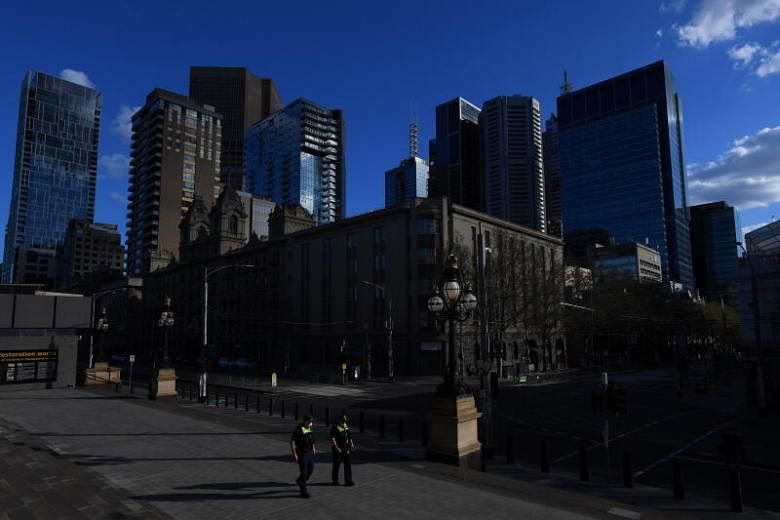SYDNEY - When the Covid-19 pandemic began spreading across Australia in March, state and federal leaders overcame their traditional bickering and instead closely cooperated in a rare show of national solidarity.
But the unity has ended following a second wave of cases in the state of Victoria that has led to fierce divisions and recriminations.
The 119-year-old federation, which includes the federal government as well as six state and two territory governments, is now coming under serious strain amid acrimonious disputes between the different tiers of government.
During the early months of the pandemic, Prime Minister Scott Morrison took the unusual step of convening a national Cabinet, which includes the leaders of the states and territories and enabled a coordinated nationwide response. The Cabinet has now met almost 30 times.
But the outbreak in Victoria led to cracks in the consensus as states have split on whether to tighten their border closures. Some states banned all domestic visitors, others restricted visitors from Victoria or from affected areas in New South Wales.
Mr Morrison, who belongs to the Liberal party, has been pushing for a speedy end to the travel bans, saying they are onerous and are causing further economic damage.
But Western Australia, which is led by a Labor government, last week rejected a plan to open interstate borders by the Christmas holiday in late December. The state is largely free of the virus and has been economically sheltered by strong China-fuelled demand for its resources.
Explaining his decision, the state's Premier Mark McGowan said: "Unlike the rest of the country, WA is not currently in a recession. So we won't be prematurely reopening our borders."
Queensland, which is led by a Labor government, has also come under intense pressure from the Federal Government to reopen its border with New South Wales.
Home Affairs Minister Peter Dutton accused the Queensland government of keeping the border shut to improve its prospects ahead of an upcoming election.
"People are right to be angry," Mr Dutton told 2GB Radio on Thursday (Sept 10). "There is no health reason (for the closure)… It's all for political reasons. Unfortunately, a lot of people are suffering and feeling the consequences."
But Queensland Premier Annastacia Palaszczuk criticised the federal government's approach, saying she "will not be bullied nor will I be intimidated".
As of Friday (Sept 11), Australia had recorded 26,565 cases of Covid-19 and 797 deaths. Of the 55 new cases on Friday, 43 were in Victoria, 10 were in New South Wales and two were in Queensland. All other states and territories had no new cases.
Beyond the dispute over travel bans, the federal government has also criticised the Victorian Labor government's handling of its outbreak. The ruling federal Liberal-National Coalition has attacked Victoria's Labor leader Daniel Andrews for failures in the hotel quarantine process, which led to the outbreak, and for having inadequate contact tracing capabilities.
Federal Treasurer Josh Frydenberg has squarely blamed Mr Andrews for the costly second wave, which has led to a stringent lockdown and an 8pm to 5am curfew.
"This has to be the biggest public policy failure by a state government in living memory,'' Mr Frydenberg told reporters recently.
The split between the federal government and some state governments has partly been driven by political partisanship.
But veteran political commentator Paul Kelly observed that a broader problem is that state governments have primary responsibility for front-line health services and so are keen to impose stringent lockdowns and border closures. In contrast, the federal government is seen as having overall responsibility for the economy and unemployment and so is urging states to wind back restrictions and open their borders.
"The big trap facing Morrison is that the premiers are being judged by their capacity to contain the virus, not by their economies," he wrote in The Australian. "Success on the medical front is achieved by lockdowns and border closures unsupported by Morrison and at the direct cost of economic recovery."
Despite pressing states to reopen their economies, Mr Morrison has continued to push for national unity. During a recent discussion of the Covid-19 crisis, he also acknowledged that "at times it has felt like Australia could break apart".
"The federation is hard, always has been," he told reporters. "Anyone who's ever sat in my office has always known that, and we've all tried to find better ways to make it work and so we remain committed to that."












